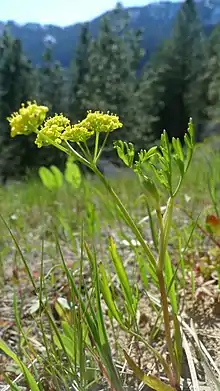| Lomatium ambiguum | |
|---|---|
 | |
| Lomatium ambiguum at Leavenworth Ski Hill, Chelan County Washington | |
| Scientific classification | |
| Kingdom: | Plantae |
| Clade: | Tracheophytes |
| Clade: | Angiosperms |
| Clade: | Eudicots |
| Clade: | Asterids |
| Order: | Apiales |
| Family: | Apiaceae |
| Genus: | Lomatium |
| Species: | L. ambiguum |
| Binomial name | |
| Lomatium ambiguum (Nutt.) J.M.Coult. & Rose | |
Lomatium ambiguum, also known as Wyeth biscuitroot, is a perennial herb of the family Apiaceae that grows in the northwestern United States and into British Columbia in dry areas. The leaves are divided into many blades, and stems can be slightly purple and are 6–24 cm tall. Yellow flowers in compound umbels appear from late April to June.
Cultivation and uses
Like many Lomatium species, this was also utilized by Native Americans. The flowers and leaves were dried and used to flavor meats, stews and salads while a tea brewed of the same parts was taken for common colds and sore throats.[1]
References
- Footnotes
- ↑ Moerman, Daniel, Native American Ethnobotany (Timber Press, Portland Oregon 1998), p. 313.
- General
- Craighead, John. A Field Guide to Rocky Mountain Wildflowers. Boston: Houghton Mifflin Company, 1998.
External links
Wikimedia Commons has media related to Lomatium ambiguum.
 Data related to Lomatium ambiguum at Wikispecies
Data related to Lomatium ambiguum at Wikispecies- USDA Plants Profile for Lomatium ambiguum (Wyeth biscuitroot)
This article is issued from Wikipedia. The text is licensed under Creative Commons - Attribution - Sharealike. Additional terms may apply for the media files.